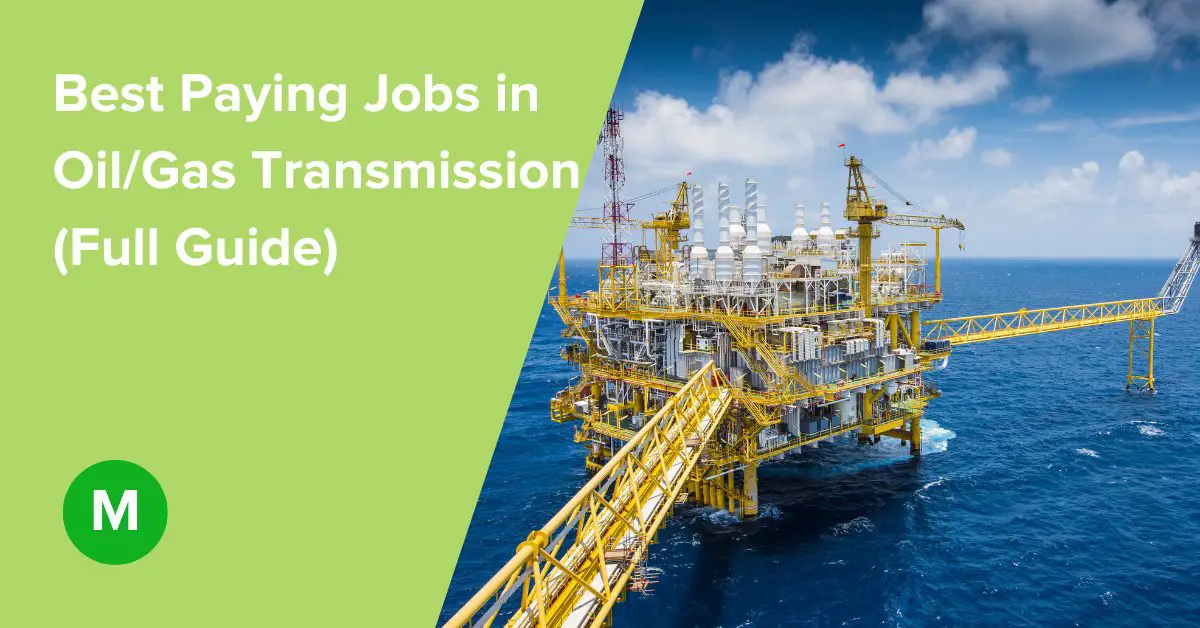Best Paying Jobs in Oil/Gas Transmission (Full Guide)
Do you want to work in the oil and gas industry? If so, you may be wondering what the best-paying jobs are. In this article, you’ll get some of the best-paying jobs in the oil/gas transmission industry.
We will also tell you how to apply for this employment. So, if you’re interested in a job in the oil and natural gas industry, stay tuned.
What are the highest-paying jobs in the oil and gas industry?
There are many high-paying jobs in the oil and gas industry. However, the exact salary will depend on several factors, such as experience, education, and location. But, in general, the following positions tend to be the highest paying jobs in this field:
Landman
A landman is responsible for negotiating leases and contracts for oil and gas exploration and production. They typically earn a salary of $66,000-$110,000 per year. Landman deals with landowners to negotiate land ownership, leases, and mineral rights on behalf of businesses, typically in the oil, gas, and mineral sectors.
A Landman researches land rights, interests, and ownership before discussions start. Additionally, a landman drafts contracts, examine titles, acquires leases, does surface land inspections, and ensures that laws and standards are followed.
Completions Engineer
A completions engineer is responsible for designing and overseeing the completion of oil and gas wells. They typically earn a salary of $101,000-$155,000 per year.
Completions engineers work with drilling engineers to ensure that the well is completed safely and efficiently. They also design completions systems, including perforating the well, installing production tubing, and setting packers.
In addition, completions engineers may also be responsible for testing the well to ensure that it produces at optimal levels.
Subsea Engineer
A subsea engineer is responsible for developing, installing, and operating subsea production systems. They typically earn a salary of $100,000-$257,000 per year.
Subsea engineers work with a team of engineers to design and develop subsea production systems. Additionally, they are responsible for installing and maintaining these systems.
Furthermore, subsea engineers may also be responsible for inspecting and repairing subsea production systems.
Petroleum geologist
A petroleum geologist is responsible for finding and evaluating new oil and gas reserves. They typically earn a salary of $88,000-$182,000 per year. Petroleum geologists use their knowledge of geology to find new oil and gas reserves.
Additionally, they use this knowledge to evaluate the potential of these reserves. In addition, petroleum geologists may also be responsible for supervising drilling operations and managing production.
Oil and gas deposits are found beneath the earth’s surface and petroleum geologists are responsible for finding these natural resources.
Rig Welder
A rig welder is responsible for welding and repairing oil rigs. They typically earn a salary of $46,000-$101,000 per year. Rig welders are responsible for welding and repairing oil rigs.
These engineers may also be responsible for inspecting and maintaining equipment. Furthermore, rig welders may also be responsible for training new welders.
Petroleum Landman
A petroleum landman is responsible for negotiating and acquiring leases for oil and gas exploration and production. They typically earn a salary of $62,000-$130,000 per year.
Petroleum landmen work with landowners to negotiate leases and mineral rights on behalf of businesses, typically in the oil, gas, and mineral sectors.
They also research land rights, interests, and ownership before discussions start. In addition, petroleum landmen may also be responsible for drafting contracts, examining titles, acquiring leases, doing surface land inspections, and ensuring that laws and standards are followed.
You will typically need a bachelor’s degree in engineering or a related field to qualify for these positions. You will also require several years of expertise in the oil and gas industry.
What is the highest-paying pipeline job?
The highest-paying pipeline job is that of a pipeline welder. Pipeline welders are responsible for welding together the pipes that make up a pipeline. Although this highly skilled and dangerous job, it pays very well.
According to the yearly average pay published in 2019 by the U.S. Bureau of Labor Statistics, pipeline welders make the most money in the pipeline transportation industry (BLS).
For instance: Operators of petroleum pump systems and pipeline welders make $72,640. With an average salary of $67,000, pipeline welders are the second highest paid in the industry.
While the exact pay for a pipeline welder depends on experience, employer, and location, this is a job that can be very well-paid. In some cases, experienced welders may make over $100,000 per year.
Pipeline welders are in high demand, and this is expected to continue. In addition, the growing energy demand in the United States and worldwide means more pipelines will be needed. This, in turn, will lead to more jobs for pipeline welders.
If you’re interested in a career as a pipeline welder, you will need to have a high school diploma or equivalent. You will also need to complete an apprenticeship or training program.
Many welders learn their trade through on-the-job training, but welding schools can also provide you with the necessary skills. Once you have the necessary skills and experience, you can start your career as a pipeline welder.
Which oil company pays the best?
The best-paying oil company in the world is Royal Dutch Shell, according to a new ranking. This Oil and Gas firm is well-known. The corporation has a salary structure that ranges from $89,726 for a business analyst to $160,078 for a finance manager.
The average salary for a Royal Dutch Shell employee is $106,848 per year. Also, the company has a great reputation and is a top choice for those looking to work in the oil and gas industry.
The second-best paying oil company is ExxonMobil, with an average salary of $105,427 annually. The firm offers a broad range of positions, from entry-level jobs to top executive positions. ExxonMobil also has a great reputation and is a top choice for those looking to work in the oil and gas industry.
How much money does the oil and gas sector pay?
The oil and gas business is well-known for its high wages. It is one of the world’s highest-paying industries. With an average yearly salary of $80,710, the industry delivers some of the highest median pay of any sector.
However, many factors contribute to this high pay. For instance, oil and gas workers typically have a high level of experience and education. They also work in some of the most dangerous and difficult environments.
Despite the high pay, working in the oil and gas industry is not all glamorous. It can be a difficult and stressful profession. Workers are regularly required to labour long hours in potentially hazardous conditions and with potentially hazardous equipment.
So, while the pay is high, oil and gas workers must be prepared to work hard and take on a lot of responsibility.
What is the highest-paid job in the world?
Petroleum geologists have the highest paying jobs in the oil and gas sector. In Canada, a petroleum geologist makes an average yearly pay of $161,946. Petroleum geologists explore the earth’s interior to find oil and gas resources.
They use their knowledge of geology and geophysics to map out these resources. Other high-paying jobs in the oil and gas sector include drilling engineer, completions engineer, production engineer, reservoir engineer, and pipeline engineer.
These professions typically demand a bachelor’s degree in engineering and several years of experience working in the oil and gas business.
How much do you get paid in the oil industry?
The average annual pay for an Oil Gas Industry in the United States is $76,474 yearly. However, salaries vary widely in the oil and gas industry depending on position, experience, education, and location.
For example, an engineer in Houston, Texas, may earn a much higher salary than someone with the same title working in a small town in Alaska. In general, oil and gas industry salaries are higher than the average for all industries.
Best oil field jobs with no experience
If you want to work in the oil industry but don’t have any experience, there are still lots of opportunities for you. Here are a few of the greatest oil field jobs for those with no experience in oil and gas production:
Drilling Rig Hand
As a drilling rig hand, you’ll be responsible for helping to operate and maintain the drilling rig using the drilling equipment. This tremendous entry-level position can allow you to learn about the drilling process and gain some valuable experience.
Pumper
A pumper is responsible for operating the pumps that move oil and gas from the wells to the storage tanks. This is a critical role in the oil field and is a great way to get your foot in the door.
Roustabout
A roustabout is responsible for various tasks, including maintaining the equipment and machinery, cleaning the worksites, and helping load and unload trucks.
This great entry-level position can give you a well-rounded view of oil field operations.
Operator
An operator is responsible for the day-to-day operations of the oil and gas industries. This includes overseeing oil and gas drilling, production, and transportation. For someone with oil field or related industry experience, this is an excellent opportunity.
Highest paying oil and gas companies
If you want to work in the oil and gas sector, you should check into some of the industry’s top corporations.
BP
This major oil and gas corporation employs around 80,000 people and operates in over 70 countries. BP’s average compensation is around $140,000.
Royal Dutch Shell
Another major oil and gas industry player, Royal Dutch Shell, has operations in more than 90 countries and employs over 92,000 people. The average salary of workers at Royal Dutch Shell is $132,255 per year or $63 per year.
The highest paid position at Royal Dutch Shell is Lead Engineer, which pays $245,000 per year, and the lowest paid job is Receptionist, which pays $37,314 per year.
Pemex
Pemex, Mexico’s state-owned oil and gas corporation, ranks third in salary. Pemex employees make an average of $51,000 per year, or $25 per hour, which is 26% less than the national wage average of $66,000 per year.
Chevron
Chevron is among the major oil and gas companies operating in over 180 countries. Chevron Corporation’s average annual income, including base and bonus, is $154,187, or $74 per hour, while the estimated median compensation is $155,654, or $74 per hour.
These are some of the top companies to consider if you’re looking for a high-paying career in the oil and gas industry. Such companies are worth checking out with competitive salaries and ample growth opportunities.
Summary
The oil and gas transmission industry is a great place to start a high-paying career. Many positions are available, ranging from entry-level oil and petroleum vessel jobs to managerial roles. With the right qualifications and experience, you can land a well-paying job in this exciting industry.
BP, Royal Dutch Shell, Pemex, ExxonMobil, and Chevron are some of the highest-paying companies in the oil and gas industry. Moreover, with operations worldwide, these companies offer ample opportunities for growth and development.
As a result, these are some of the top companies to consider if you’re looking for a high-paying job in the oil and gas industry.
Further Reading







